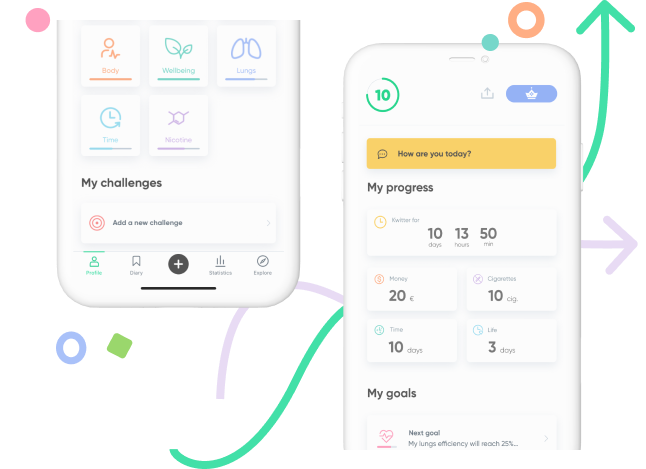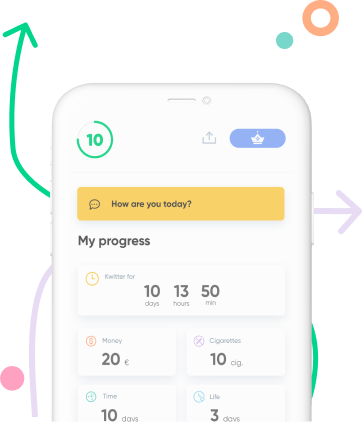August 4, 2021
Tips
How to quit smoking? Tips to help you get ready!
You've decided to quit smoking? Congratulations! The following tips will help you prepare and understand how to quit smoking.
Freeing yourself from tobacco dependence is not a small task! However, it's a healthy choice that can only bring you good things. Once the first few crucial weeks are over, it is new life that begins: new feelings, less stress, better sleep, healthier lungs, healthier interactions, etc. The question is how to quit smoking and make this change effectively? Kwit's quit smoking preparation program will help you do that!
The first stages of change
According to psychologists Prochaska & Di Clemente (1992), change occurs in stages. When we have the impression that smoking has only beneficial effects and when we see no reason to change, we are in a stage called pre-contemplation. Then, little by little, doubts about smoking may arise, and the individual will begin, consciously or unconsciously, to weigh the pros and cons of quitting, until the arguments PRO win the battle: this is the contemplation phase, during which the decision to quit is made.
Once the decision is made, the next step is to develop a strategy before actively engaging in the quitting process. This is called the preparation stage. But, in practical terms, how do you quit smoking when you get to this preparation stage? This is where our smoking cessation program can help you!
If you are interested in our quit smoking preparation program, download Kwit and try it out!
How to prepare to quit smoking?
The following tips can help you prepare once you've decided to quit smoking.
Prepare to quit smoking by understanding your motivations
Start by thinking about what made you decide to quit: what is your reason for quitting? Is it a desire to be healthy, is it something your family and friends have asked you to do, or is it a desire to have a child? Clearly identifying why you have chosen to change will help you stay on track and give you the strength to move forward.
Also, think about what makes you want to keep smoking. Are you using cigarettes as:
A reward?
A way to relieve anxiety?
A way to stimulate yourself or as a way to deal with boredom?
By paying attention to your consumption throughout the day, you will realize that some cigarettes respond to very specific triggers that are recurrent day after day, at more or less at the same time and in the same context. In a nutshell, they are part of your routine, while others are more random, such as cigarettes offered by a friend or those that fill a few empty minutes in your day. First, try to identify these less deeply rooted cigarettes so that you can replace them with other behaviors that are better for your health:
Drinking a glass of water.
Reading a magazine article.
Writing to a friend.
Checking your Kwit application.
Etc.
A few minutes later, ask yourself this question: after all, did I really need it?
Regular cravings are often physically imprinted on your brain because nicotine changes its function and structure. It sets up a nicotine cycle in your body, causing cravings to strike at regular times. You may believe that you're freely taking this time to smoke, but it's just the lack of nicotine that is ringing the alarm bells. If you've ever tried to quit smoking in the past, you know that the lack of nicotine can make you feel unwell for a few weeks. It's then a matter of finding strategies to better cope with those feelings, until they disappear on their own. Whenever these cravings occur, Kwit offers you strategies to cope with them!
Preparing to quit smoking by debunking misconceptions.
Beyond the apprehension linked to withdrawal symptoms, many smokers hold misconceptions about smoking and quitting:
Cigarettes are necessary to relax.
It's too late to quit.
I will keep having cravings for the rest of my life.
I will gain a lot of weight.
Etc.
All of these fears and misconceptions are common, don't worry, you are not alone! That being said, many of them are partially or completely unfounded. Reading more about how your body works and about the addiction processes will help you to better understand what is going on, as well as to anticipate and prepare for possible difficulties. This will help you a lot.

Quitting smoking together is even better!
However, these testimonials and preparation steps will not help you if you don't believe in yourself and your ability to succeed! Have confidence in your abilities: unfortunately you got into smoking one day, but you can get out of it ! Any habit can be reversed by replacing it with another. So think of quitting smoking not as a loss but as a building process. You will build new habits to get closer to the person you want to be and regain a non-smoking identity.
If your loved ones smoke, take this opportunity to suggest quitting smoking together! Support from friends and family will be very helpful in difficult times. But be careful not to rush others! You may not be at the same stage of change. So, what applies to you doesn't always apply to others at the same time. Be kind and patient with yourself, as well as with those around you.
And finally, remember that quitting smoking is a gateway to a new life, free from dependence. Think of the money and time you will save and what you will be able to do with it! Dream big, and really treat yourself! What if you start looking for a trip to a paradise island? Sure, the trip will only last a few days, but it will be an infinitely rich experience that will remain forever engraved in your memory, unlike the cigarette you just smoked...
You are now armed with some tools to move on! To help you day after day, Kwit has developed a personalized and fun 9-step smoking cessation preparation program that will help you move forward calmly towards your chosen quit date! So don't wait any longer and download Kwit to test it!




